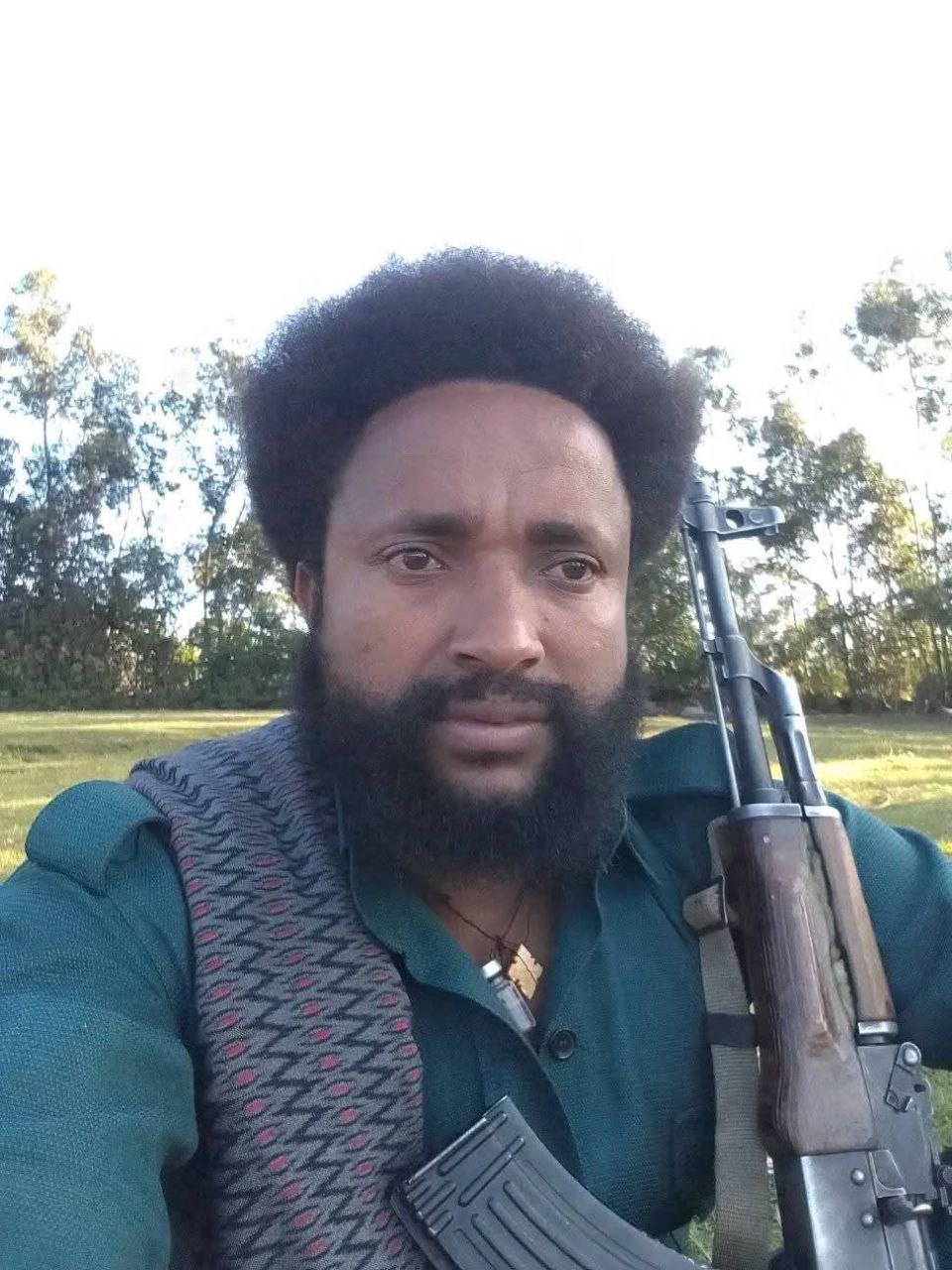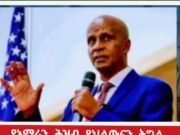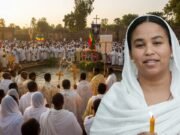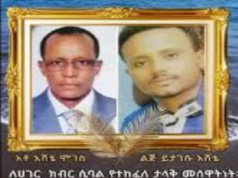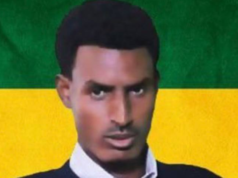The announcement of a new prime minister has led to widespread celebrations, but reforming the country without alienating the army will not be easy.
BY NIZAR MANEKADDIS ABABA, Ethiopia — In 1990, the Ethiopian People’s Revolutionary Democratic Front (EPRDF) was a guerrilla alliance battling the Derg, a Marxist-Leninist military junta that had deposed Emperor Haile Selassie in a 1974 coup. A year later, the EPRDF took power; it has ruled Ethiopia ever since.
When the Derg fell, Abiy Ahmed, who was recently elected as the EPRDF’s chairman and sworn in as prime minister on Monday, was just 14 years old. But even then, Abiy, who was born to a Muslim father and a Christian mother in the Oromo town of Beshasha in southwestern Ethiopia, was becoming politically active.
“In one way, the world is eagerly awaiting our country’s transition, and in another way, they are waiting in fear,” Abiy said in his maiden speech as prime minister. “We have a country in which our fathers have sacrificed their bones and spilled their blood,” and yet the nation has kept its unity. “This is the season in which we learn from our mistakes and compensate our country,” he continued. “I ask forgiveness from those activists and politicians who paid the sacrifice and youths who wanted change but lost their lives.” He even spoke of applying Ethiopia’s constitution in a way that understands “freedom,” especially freedom of expression and the rights to assembly and association — suggesting that he may lift the state of emergency that has led to the detention of more than 1,100 people.
In the capital of Addis Ababa, people in cafes clapped and cheered in front of television screens.
In the capital of Addis Ababa, people in cafes clapped and cheered in front of television screens.
At a town on Ethiopia’s porous southern border with Kenya, where Ethiopia’s military last month announced it had mistakenly killed Oromo civilians, locals celebrated by slaughtering camels, cows, and goats. People in Jimma, the largest city in southwestern Ethiopia, were singing; a student at Jimma University told me, “We have got one of our own!”
More than a third of Ethiopians belong to the Oromo community and about a fifth to the Amhara, while Tigrayans represent 6 percent, according to the latest census. Together, the Oromo and Amhara make up more than half of Ethiopia’s population of 105 million. These demographic realities and the distribution of power among these groups are the defining feature of Ethiopian politics.
Abiy joined the Oromo People’s Democratic Organization (OPDO) and the EPRDF in 1991, according to his official biography. He decided to join the OPDO after his brother, Kedir, was killed, according to Abiy’s childhood friend Seyfu Imam Abamilki. The same year, the OPDO was part of the advancing EPRDF army seeking to smash Derg forces and take Addis Ababa. At that time, the OPDO was a small organization that the Tigrayan People’s Liberation Front (TPLF) established in late 1990; it became part of the EPRDF in January 1991.
As a young man finding his feet, Abiy was one of at most 200 OPDO fighters placed under the overall military command of the EPRDF forces, which in 1991 numbered about 100,000 — 90 percent of them Tigrayans. Abiy, despite his Oromo origins, was quick to adapt, starting as an assistant to the military and learning the Tigrinya language. As a Tigrinya speaker, he could get ahead, given the preponderance of Tigrayan soldiers and officers. And it has continued to serve him well; Tigrayans remain preeminent in Ethiopia’s ruling coalition and control the military, intelligence, and security organs of the state.
In 1993, when Abiy was in his late teens, he became a regular soldier. He enrolled in what would become the new federal army — the Ethiopian National Defense Forces — as part of an OPDO division and eventually rose to the rank of lieutenant colonel. In 1995, Abiy had to formally leave the OPDO; the EPRDF’s new constitution would be “free of partisanship” and forbade membership in any political organization. The same year, he was deployed as a member of the United Nations peacekeeping force in Kigali in the wake of the Rwandan genocide.
After nearly two decades of military service, Abiy left the army in his early thirties, became a civilian, and re-entered the OPDO; his final military post was as deputy director of the Information Network Security Agency, which provides technical intelligence to support the government on matters of national interest. A few years earlier, he was posted back to his hometown of Beshasha, where he successfully defused communal tensions following an incident between Muslims and Christians, his old friend Seyfu and a government official in the town, Mohammed Abajojam, told me.
In quick succession, Abiy became a member of the EPRDF-controlled parliament, the OPDO central committee, and then the politburos of both the OPDO and EPRDF. He began a rapid ascent through the corridors of power, serving as director of the national science and technology information center and, briefly, as minister of science and technology under former Prime Minister Hailemariam Desalegn, who resigned in February, triggering a leadership crisis.
At 41, Abiy is Africa’s youngest leader — and he is pursuing a different path than many others in the region.
At 41, Abiy is Africa’s youngest leader — and he is pursuing a different path than many others in the region.
“Now more than any other countries of the world, for us, ensuring democracy is about our existence,” Abiy told parliament. “We have to keep in mind that Ethiopia is ours and build a participatory democracy that allows everyone’s voice to be heard and everyone to benefit.”His last job offers a hint of his policy preferences. As Oromia’s deputy president, Abiy headed the region’s Housing and Urban Development Bureau, where he and other top officials embarked on an ambitious policy of economic revolution, seeking to address the burning issue of mass unemployment and deep-rooted grievances among legions of disaffected youth in Oromia, which has been a hotbed of anti-government protests for nearly three years. “In Oromia, unemployment is more than 80 percent, around 6 million youths are unemployed,” and almost half of Oromia’s population is under 15, Abiy told me in June while working on a program to overhaul employment, supply chains, and revenue sharing in cement mining in Oromia. “Nobody can stop them by gun,” he said. “They’re not an enemy but a power that can help the government in the development process.”
For now, Abiy’s elevation to prime minister has quieted Ethiopia’s most confrontational voices. This could quell violent protests in Oromia, which intensified late last year amid severe clashes between security forces from Ethiopia’s Somali region and Oromo in eastern Ethiopia, triggering serious intraparty conflict within the EPRDF. In his speech, Abiy pledged to crack down on corruption, which, according to Jamil Abdisalam, the mayor of an Oromo town in the east, has been the primary cause of the violence that recently prompted approximately 1 million people to flee their homes. He attributed the disturbances to senior federal and military officials and their business associates who monopolize trade in black market dollars and contraband on the boundary.
All eyes are on Abiy’s next moves and whether he will manage to reorient the political system to give the Oromo the representation they demand and turn a one-party system into something more democratic.
All eyes are on Abiy’s next moves and whether he will manage to reorient the political system to give the Oromo the representation they demand and turn a one-party system into something more democratic.
In Ethiopia’s complex and delicate ethnic federation, Abiy will be watched closely by proxies from myriad other ethnic groups and forces for any failings, and they may react negatively should they get the impression that Abiy is unilaterally working for the advantage of the Oromo. After all, the OPDO now controls the office of the prime minister, the post of speaker of parliament, and the presidency — nominally, the three most important positions in the state. Oromos can surely now become the most influential ethnic group.But Abiy is making conciliatory gestures. “In one country, there will be differences in ideas,” Abiy told parliament. “Difference is not a curse when we listen to each other, and when we agree based on principle, it brings blessings. In argument, solutions will be found.”
To find those solutions, he will need to avoid angering the army and security forces. In Ethiopian politics, “security, intelligence, military are the gods,” said Masresha Taye, an expert observer. “If you know God, will you be afraid of him,” he added. “Abiy and the top OPDO cadres, they know God. They know the intelligence. They know the security. They have been there for 20-plus years. They know who is doing what.”
The Tigrayan-dominated army and intelligence services could find Abiy well qualified because he speaks their language and understands their needs. They also might find him difficult to work with because they know each other so well. That will depend on his agenda. Abiy is likely to reshuffle his cabinet soon. At the moment, Getachew Assefa, the director of the national intelligence and security service and a veteran TPLF official, remains directly attached to the prime minister’s office and holds the rank of minister without portfolio. How these godlike security officials operate may be mysterious for others, but Abiy “has been groomed within that system,” Masresha adds. He knows how to navigate the military bureaucracy.
That knowledge matters because, as prime minister and commander in chief of the armed forces, Abiy is expected to preside over a major military reorganization. Before the previous prime minister resigned, he announced the promotion of three major generals — one Oromo, one Tigrayan, and one Amhara — to newly created deputy posts under Gen. Samora Younes, the army’s Tigrayan chief of staff. With their promotions, it seemed clear that one of them was being positioned to succeed Samora as chief of staff. Abiy will be able to influence the selection of Samora’s successor, but any deal must ultimately be negotiated with the army. The negotiators could make an ethnic calculation to address Oromo or Amhara grievances about not having a large enough presence in the military’s top ranks.
Just as Abiy will not have a completely free hand in determining the military’s leadership, he will also have to build consensus before making other key policy decisions.
Just as Abiy will not have a completely free hand in determining the military’s leadership, he will also have to build consensus before making other key policy decisions.
It is worth recalling that the eight-day meeting of the EPRDF Council that culminated in Abiy’s selection gave him just 108 votes out of 169 (less of a consensus than his predecessor), and it took six weeks after Hailemariam resigned before the ruling coalition finally made up its mind on a successor. This suggests that there is serious discord among Ethiopia’s leadership. However, the fact that Abiy was not elected in a unanimous vote points to a rare glimmer of democracy within the EPRDF’s Leninist-inspired tradition — and that is a major development in EPRDF culture.Some of that discord may be easing. Abiy’s deputy prime minister, Demeke Mekonnen, the chairman of the Amhara National Democratic Movement, announced over the weekend that “the growing mistrust” had receded. Demeke withdrew from the leadership race at the 11th hour, with the region’s spokesperson cryptically announcing that the Amhara party “played its own role” in the process of “electing a competent leader.”
Abiy will now be obliged to walk a fine line to satisfy the aspirations of his fellow Oromo, especially pressures from constituencies who say they facilitated his ride to the top. He must also be careful not to alienate others, particularly the military. “If Abiy holds the full power and responsibilities of the premiership and establishes his own cabinet including the heads of intelligence and military and opens the political space for all, it will be a new era for Ethiopia,” Lammi Begna, an Oromo youth activist who has helped spearhead anti-government protests over the last years, told me by phone from Oslo, Norway. “Our demand is for real change, and we want it to be effective very soon.”
Whatever changes Abiy chooses to introduce as prime minister, he will have to negotiate with other factions of the ruling party; in the EPRDF’s politburo, which tends to set government policy, the OPDO holds only nine out of 36 seats. And even in parliament, the OPDO does not have a majority. Abiy’s room for maneuver will therefore depend on cooperation from the EPRDF’s other three parties, especially Oromia’s newfound Amhara allies.
So far, he is sounding the right notes. “I present my offer to Ethiopians that are here and also abroad that we forgive one another and close yesterday’s chapter and start another,” he told lawmakers in his speech to parliament.
In the weeks before Abiy’s selection as leader, even the most seasoned observers were mulling the possibility of a Yugoslav-style fragmentation in Ethiopia. Now, for the first time in years, there is reason for cautious optimism.



